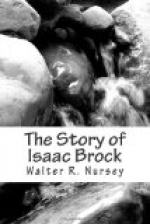“If this sort of thing lasts,” commented our hero to a friend, “I am afraid I shall do some foolish thing, for if I know myself there is no want of what is called courage in my nature, and I can only hope I shall not be led into some scrape.”
[Illustration: VIEW OF QUEENSTON HEIGHTS AND BROCK’S MONUMENT]
CHAPTER XXII.
PREVOST’S ARMISTICE.
The armistice paralyzed Brock’s movements. All the moral influence and material advantage gained by the captures of Mackinaw and Detroit were nullified by this incredible blunder, for which no reason, military or civil, has ever been assigned. The loyal volunteers were released from duty. Brock’s Indian allies returned to their villages. Prevost’s policy of peace had become a mental malady. In spite of our hero’s pleadings, and though Prevost actually knew, before the fall of Detroit, that President Madison would not extend the two weeks’ armistice, the Governor-General forbade Brock attacking either Sackett’s Harbour, the key to American supremacy on the lakes, or Fort Niagara.
“War,” wrote Prevost, “has never yet been declared by England. Peace is possible.”
Brock, smarting under restraint and handcuffed by red tape, was compelled to look on while the enemy brought up reinforcements, powder, shot, provisions and other munitions of war, by water to Lewiston. General Van Rensselaer, in command of the American forces at Lewiston, wrote to the President stating that by “keeping up a bold front he had succeeded in getting from General Sheaffe at Fort George the uninterrupted use of the lakes and rivers.” The strategic advantage to the enemy of this cessation of hostilities and the privileges conceded was enormous. Prevost realized his error too late. The following year, conceiving it then to be his special mission to borrow our dead hero’s policy, he attacked Sackett’s Harbour, but his “cautious calculation” was, of course, rewarded by ignoble defeat, and ultimately, after the Plattsburg fiasco, by a court-martial. In his civil administration of Canada Sir George Prevost may have been a success; as a soldier he was a sad failure.
Isaac was daily proving the truth of the precept, recognized by all men sooner or later, that life’s values lie not so much in its victories as in its strife.
Though Brock awoke after Detroit to find himself famous, and a hero whose prowess far exceeded that of his ancestor, the Jurat of the Royal Court of Guernsey, over whose exploits he used to ponder seated on the Lion’s Rock at Cobo, he was still the same “Master Isaac,” still the “beloved brother.” Separation from his kinsmen only served to draw him closer.




